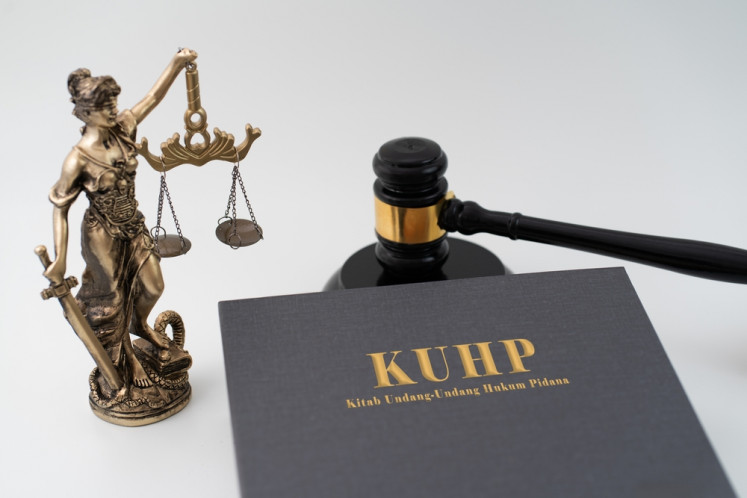Popular Reads
Top Results
Can't find what you're looking for?
View all search resultsPopular Reads
Top Results
Can't find what you're looking for?
View all search resultsHadassah Emmerich: Looking beyond identity
The question of identity is an ever-present theme, which many artists like to explore as part of their self-discovery
Change text size
Gift Premium Articles
to Anyone
The question of identity is an ever-present theme, which many artists like to explore as part of their self-discovery.
JP/R. Berto Wedhatama
Berlin-based painter Hadassah Emmerich, who has a German-Dutch-Indonesian-Chinese background, however, said she had moved past trying to use art as a way to discover herself.
Her mixed-background prompted her to explore themes on different cultures, although she said she had abandoned using art to retrace her heritage background or reconnect with different cultures to find herself.
“I think now I’ve accepted more that you will never really know. It’s also up to you to be who you want to be,” she said. “I’m interested in artwork, not necessarily ‘me’ anymore,” she said.
The 36-year-old was in Indonesia recently for her latest exhibition at the Dutch cultural center Erasmus Huis, running from April 10 to May 4. Titled “Exopolis: Kembali ke Jakarta” (Return to Jakarta), she delves into exoticism in a playful manner. Her work in Exopolis consists of layers of different symbols taken from various cultures, times and settings, such as replicas of Paul Gauguin’s art.
Emmerich is the artist behind a noteworthy mural on the wall of the Dutch Embassy in Jakarta. Art commentator Carla Bianpoen likens the mural to “a maze of vibrant, exuberant, tropical colors evoking a sense of idiosyncratic yearning for a paradise lost”.
Having won several art prizes, Hadassah has exhibited her artwork since 1996, but it was her solo exhibition titled “With Love from Batik Babe” in 2005 that put her on the map.
Sitting in the Jakarta Arts Institute (IKJ) art department gallery after giving a lecture to students there, Emmerich talked to The Jakarta Post about how her heritage influenced her art, her search for identity and her journey as an artist.
“Without this background I may be searching within other sources, it’s hard to tell because you will never know how it would be otherwise,” she said.
“It makes me more curious on how cultures connect and where they connect. For example, I am attracted to universal stories, which are often love stories,” she said. “I’m also attracted to make collisions, to bring spirits together from different cultures that would never meet in real life. I figuratively take them from their graves and bring them back into one exhibition,” she said.
She recalling questioning her identity in her teenage years. Her Indonesian father moved to Holland when she was 6 years old. Her grandmother lived in the same house until Emmerich’s parents divorced. “Because my parents divorced, I lived with my mother and [our Indonesian culture] disappeared a little,” she said.
“Like every teenager, I asked ‘Who am I?’ and ‘What does this mean?’ ‘Is this exotic?’ and ‘How do people see me?’” she said. She even changed her name for five years until she was 17 from Hadassah to Marissa.
Hadassah is an uncommon name of Hebrew origin meaning myrtle tree. Emmerich said she did not have a Jewish background that she knew of and felt that her name did not suit her then.
She visited Indonesia in 1996 and studied art in Bandung. She came to Indonesia to answer three questions: Who am I? Do I have something in common with Indonesia? And, what is the art scene there?
“At that time it really was a big fantasy for me to come here, to explore,” she said.
However, her visit to Indonesia did not give her answers. “I came back with more questions and confusion,” she said.
Now, Emmerich said that she took on a more “mature” viewpoint. She said previously she used the questioning of her mixed-background identity or her femininity to drive her art but shifted to bigger themes after studying her Master’s of Arts in Fine Art in London. “I’m more interested in learning more about history and literature instead of questioning ‘who I am’.”
“The degree really helped me distance myself from what we call ‘navel looking’,” she said.
“In London, I learned even if I don’t have mixed blood, I can still come and take what I want. That’s the kind of attitude in London. It’s very rigorous, very cold. I was really surprised by that,” she said.
She said that she took her questions and gave them broader views. She added she was inspired by other artists “who had done the dirty work” to use as pawns in her stories. This she said was aimed to point to certain problematic themes.
Emmerich acknowledged that artists or art commentators of the older generation might not agree with her approach in playing with “exotic” styles, a theme she said people steered away from. She said people would consider it taboo to say Gauguin was good. “People are scared to take him on and are concerned about being politically correct,” she said. “Of course for the older generation, things have much more value and are untouchable,” she said.
But, she said that artists of her generation, who can apply many different references by connecting to the Internet, had more freedom in their art. Her approach, in taking different cultural symbols, gave her more freedom and she could be the “background”. “I’m a medium somehow,” she said.
Emmerich, who is expecting a baby, said that being a mother might also indirectly influence her work. “It makes me think of other things; maybe larger themes. I think it connects me to something very ancient, or universal. But how this will form, it’s difficult to say.”
Her Indonesian father moved to Holland when she was 6 years old.










